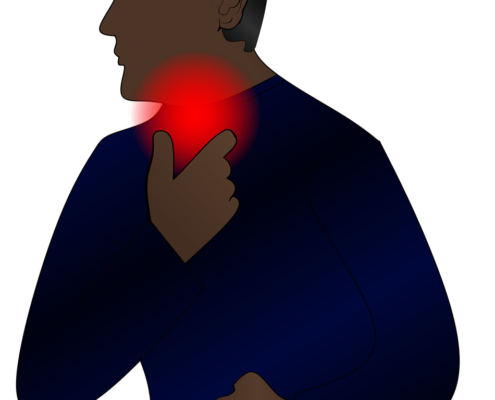Healing Power of Omega 3 and Throat Health
From Throat Remedies to Whole-Body Wellness, Omega 3 and throat health implications goes beyond the norm for these fatty acids. Often hailed for their anti-inflammatory prowess, Omega-3 fatty acids have emerged as a potent force in the realm of health and wellness. If you’re experiencing bad breath from your throat or anything related to less than ideal throat states, this post is for you!
Now, Omega 3 and throat health vibes may be on the rise.

- New Report Says Your Brain Could Be the Key to Reducing Phlegm Over 50
- Doctor's "Leave The Throat Phlegm Behind" Tutorial Goes Viral With People Over 50
- Can You Relieve Throat Phlegm and Coughing In 60 Seconds A Day? This Doctor Says Yes
- How To Banish Phlegm When 50+ (Do This Every Day)
Omega-3 and Throat Health: An Introduction
These essential fats, prominently found in salmon oil, have taken center stage for their ability to quell inflammation, making them a versatile ally in the quest for overall well-being.
In this SANE MD throat cleaner article, we’ll embark on a journey through the multifaceted benefits of omega-3 fatty acids, beginning with their role in soothing throat discomfort and infections, before delving into their broader impact on the human body. One of the main ingredients in SANE Vitaae is in fact – Omega-3!
Omega-3’s Quieting Attenuate Coughing Fits
A persistent, irksome cough can disrupt daily life. Omega-3 fatty acids, especially those sourced from salmon oil, bring a welcome reprieve.
These remarkable fats possess innate anti-inflammatory properties, capable of calming irritated throat tissues and easing the incessant urge to cough.
Before delving into their potential effects on coughing, let’s first understand what Omega-3 fatty acids are and why they are considered essential for our overall health.
What Are Omega-3 Fatty Acids?
Omega-3 fatty acids are a group of polyunsaturated fats that are crucial for various bodily functions. They are primarily found in certain types of fish, flaxseeds, and walnuts. Omega-3s are renowned for their anti-inflammatory properties and are divided into three main types: ALA, EPA, and DHA.
ALA: The Precursor
Alpha-linolenic acid (ALA) is the plant-based Omega-3 fatty acid found in flaxseeds and chia seeds. It can convert into EPA and DHA in the body, potentially impacting inflammation.
EPA and DHA: The Marine Omega-3s
Eicosapentaenoic acid (EPA) and docosahexaenoic acid (DHA) are predominantly found in fatty fish like salmon and mackerel. These two Omega-3s are renowned for their anti-inflammatory effects, which can be beneficial in managing coughs.
Reducing Airway Inflammation
Airway inflammation is a common factor in respiratory conditions that lead to coughing. Omega-3s, particularly EPA and DHA, may help in reducing this inflammation, potentially providing relief.
Immune System Support
A strong immune system is vital in fighting off infections that can trigger coughs. Omega-3s can enhance the immune response, making it easier for your body to combat illnesses.
Streptococcus Pneumoniae vs Omega-3
Emerging research suggests that omega-3 supplementation could potentially alter the course of Streptococcus pneumoniae infections. By taming excessive inflammation and fortifying the immune system, omega-3s stand as silent challengers against this bacterial adversary.
Sea-cod oil supplementation was shown to actually alter the course of Streptococcus pneumoniae infection in mice almost over a decade ago in this study here!
Throat Pain and Flu Aches Eased by Omega-3
Throat pain, particularly when coupled with the flu, can be excruciating. Omega-3 fatty acids, derived primarily from salmon oil, have showcased their potential to reduce inflammation effectively. This reduction may actually translate to less pain and discomfort, making the flu season more bearable.
Infections
Omega-3 fatty acids are renowned for their ability to combat inflammation effectively. They work by inhibiting the production of pro-inflammatory molecules in the body, thus serving as a crucial component in bolstering the immune system’s defenses against infections.
This anti-inflammatory action helps create a healthier internal environment, making it more challenging for invading pathogens to establish a foothold and cause illness. In essence,
Omega-3 fatty acids act as vigilant guardians of health by fortifying the body’s natural defenses and promoting overall well-being.
Omega-3 Full Body Effects
Omega-3 fatty acids have long been celebrated for their numerous health benefits, but their influence extends far beyond a single aspect of well-being.
These essential fats, found abundantly in certain foods and supplements, wield a remarkable influence on the entire body.
From supporting heart health to nurturing brain function and even potentially aiding in the management of inflammatory conditions, the comprehensive impact of Omega-3s on our physiology is nothing short of extraordinary.
In this exploration of “Omega-3 Full Body Effects,” we will delve into the multifaceted ways in which these fatty acids contribute to overall health and vitality.
Heart-Healthy
Omega-3s have gained acclaim for their remarkable cardiovascular benefits. They have the power to lower triglyceride levels, reduce blood pressure, and promote overall heart health. Through their ability to enhance circulation and subdue inflammation, they effectively lower the risk of heart disease.
Brain Health
EPA and DHA, two vital omega-3 fatty acids, play an indispensable role in brain function. They are instrumental in maintaining cognitive clarity, memory retention, and mood stability. Consistent consumption of omega-3-rich foods or supplements can potentially safeguard against cognitive decline.
Joints
For individuals grappling with joint discomfort, omega-3s can be a lifeline. These fats excel at mitigating inflammation within the joints, potentially alleviating the discomfort linked to conditions like arthritis.
Skin Deep
Omega-3 fatty acids contribute to the health and radiance of the skin. They nurture the skin’s moisture barrier, subdue inflammation, and even provide relief from conditions such as eczema and psoriasis.
Visionary Protection
EPA and DHA, abundant in omega-3s, are vital for retinal health. Consuming omega-3s can serve as a shield for your vision, particularly against age-related macular degeneration.
Future of Omega-3 Fatty Acids?
Omega-3 fatty acids have emerged as versatile champions of health, offering solutions for diverse wellness goals, from alleviating persistent coughs to enhancing resilience against infections, and promoting cardiovascular and cognitive well-being.
However, it’s essential to remember that Omega-3 supplements, while promising, should be part of a broader treatment strategy and may yield varying results among individuals.
Looking ahead, future research in the realm of Omega-3 fatty acids is poised to uncover even more intricate details about their mechanisms and potential applications. Scientists will likely explore the precise dosages and combinations that maximize their therapeutic effects.
Additionally, ongoing studies may shed light on how Omega-3s can be tailored to address specific health concerns, further refining their role in personalized healthcare.
Embracing the Omega-3 journey remains a steadfast path to a healthier and more vibrant life, and future research is bound to illuminate new avenues for their utilization in optimizing human health.

- New Report Says Your Brain Could Be the Key to Reducing Phlegm Over 50
- Doctor's "Leave The Throat Phlegm Behind" Tutorial Goes Viral With People Over 50
- Can You Relieve Throat Phlegm and Coughing In 60 Seconds A Day? This Doctor Says Yes
- How To Banish Phlegm When 50+ (Do This Every Day)
Omega 3 and Throat Health FAQs
FAQ 1: Can omega-3 fatty acids really help with throat discomfort and infections?
Omega-3 fatty acids, particularly those found in salmon oil, possess anti-inflammatory properties that can help soothe throat discomfort and may have a role in supporting the immune system against infections. However, they should not replace medical treatment for infections.
FAQ 2: Are omega-3 supplements necessary, or can I get enough from my diet?
While dietary sources of omega-3s, like fatty fish, are preferred for overall health, some individuals may consider supplements to meet specific health goals or address deficiencies. Consulting a healthcare provider is advisable to determine individual needs.
FAQ 3: Are there any side effects or risks associated with omega-3 supplements?
Omega-3 supplements are generally safe for most people. However, they can sometimes cause side effects like digestive issues or bleeding in some individuals, especially when taken in high doses. It’s essential to consult a healthcare professional before starting any supplement regimen.
FAQ 4: How can I incorporate more omega-3s into my diet?
To boost your omega-3 intake, consider adding fatty fish like salmon, mackerel, or sardines to your meals. You can also include walnuts, flaxseeds, and flaxseed oil in your diet. Alternatively, omega-3 supplements are available, but dietary sources are often recommended for a well-rounded approach.
FAQ 5: Can omega-3s be helpful for conditions other than throat health?
Yes, omega-3s have a broad spectrum of health benefits. They are known to support heart health, brain function, joint health, skin health, and even vision. Incorporating omega-3-rich foods into your diet can contribute to overall well-being.
SANE MD Trending Throat Health Articles:
Dr. Matthew Olesiak, MD, is the Chief Medical Director at SANESolution, a renowned wellness technology company dedicated to providing evidence-based solutions for optimal living. Dr. Olesiak earned his medical degree from the prestigious Jagiellonian University Medical College in Kraków, Poland, where he developed a strong foundation in medicine.






